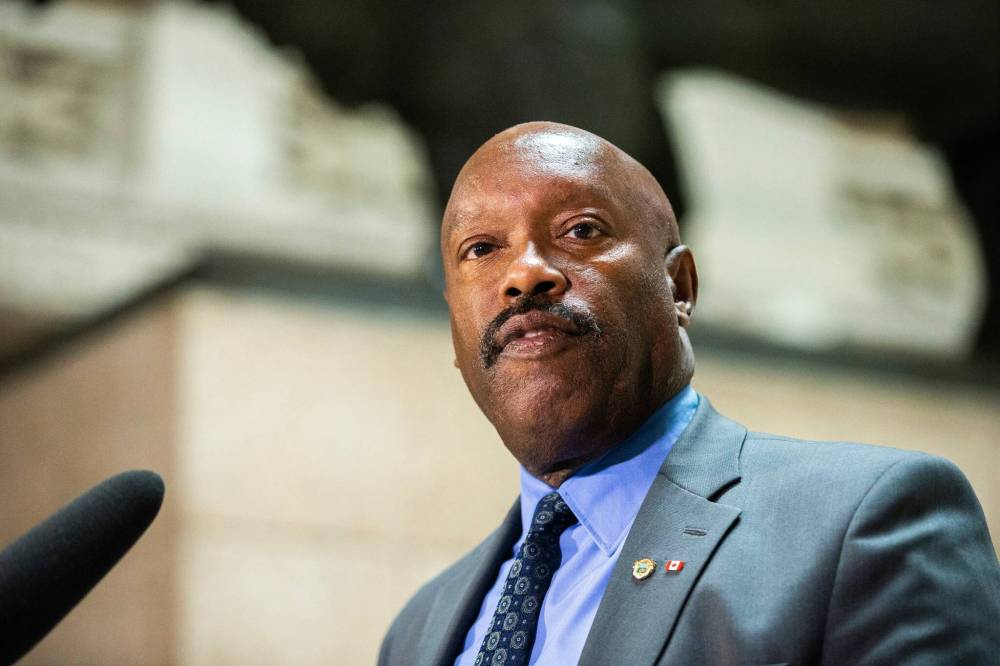Decorum, or deflection?
Advertisement
Read this article for free:
or
Already have an account? Log in here »
To continue reading, please subscribe:
Monthly Digital Subscription
$0 for the first 4 weeks*
- Enjoy unlimited reading on winnipegfreepress.com
- Read the E-Edition, our digital replica newspaper
- Access News Break, our award-winning app
- Play interactive puzzles
*No charge for 4 weeks then price increases to the regular rate of $19.00 plus GST every four weeks. Offer available to new and qualified returning subscribers only. Cancel any time.
Monthly Digital Subscription
$4.75/week*
- Enjoy unlimited reading on winnipegfreepress.com
- Read the E-Edition, our digital replica newspaper
- Access News Break, our award-winning app
- Play interactive puzzles
*Billed as $19 plus GST every four weeks. Cancel any time.
To continue reading, please subscribe:
Add Free Press access to your Brandon Sun subscription for only an additional
$1 for the first 4 weeks*
*Your next subscription payment will increase by $1.00 and you will be charged $16.99 plus GST for four weeks. After four weeks, your payment will increase to $23.99 plus GST every four weeks.
Read unlimited articles for free today:
or
Already have an account? Log in here »
Hey there, time traveller!
This article was published 19/03/2024 (598 days ago), so information in it may no longer be current.
When a bylaw launched the City of Winnipeg’s police board in November 2012, councillors heralded it as a step forward to creating openness and transparency into police oversight.
Fast-forward 12 years and questions can be raised about how those well-intentioned goals are being met, or whether there is any effort in reaching them whatsoever, at least when contentious topics such as deaths involving members of the Winnipeg Police service are concerned.
Skepticism in the board is on the rise after its meeting March 8, when Coun. Markus Chambers, the board’s chair, cut off Inez Hillel, who spoke on behalf of Winnipeg Police Cause Harm, a volunteer group that advocates for defunding the police service and reallocating its resources to other services, during her presentation.
Hillel began speaking about the police budget, describing it as bloated, and followed by saying the police service had killed nine people and traumatized numerous others since the last budget was approved.
That’s when Chambers quickly intervened, ruling her comments didn’t meet decorum, and called a halt to her presentation.
The police board meeting is one of many committees and council meetings held at City Hall that are regularly open to the public. They also accept delegations who can present their input into issues to the committee, who may or may not refer to it in their deliberations.
Order at the meetings must be maintained, but as Chambers showed, decorum is in the eye of the beholder.
The board’s duties include developing strategic plans and presenting operating and capital budgets for the police service for city council to consider.
Chambers and the rest of the board had two options on how to react to the presentation when they learned the police-abolitionist group was among the delegations to speak during the meeting.
One was to let them have their say, thank them for their time, move on to the next item on the meeting’s agenda, letting their criticism fade away like ripples in the water.
He could have also mentioned the Independent Investigations Unit of Manitoba is in charge of looking into deaths involving police officers in the province, not the police board, and suggest they refer their presentation to that organization.
By choosing to silence Hillel, Chambers allowed critics of the police service, the police board and the funding levels it recommends to city council another reason to find fault with the city and the police while stirring up its supporters on social media.
MIKAELA MACKENZIE / WINNIPEG FREE PRESS / FILE Markus Chambers, councillor and chair of the Winnipeg Police Board.
Chambers’ move also suggests the police board, and by extension the City of Winnipeg, is too thin-skinned to listen to criticism — whether it is warranted or not — and would rather dodge the matter of the number of deaths involving the Winnipeg Police Service entirely.
Politicians portray themselves as more courageous than that when they’re on the campaign trail.
They often proudly mention how willing they will be to tackle challenging issues, how open they will be with the public and that they will make difficult decisions, even if they are politically unappealing.
Listening to the people and their complaints is part of the job description for elected representatives, and Chambers and the police board chipped another small piece of democracy’s foundation away when they silenced their critics.
The next time Winnipeg Police Cause Harm, or another other opponent of the Winnipeg Police Service makes a presentation at the police board — and no doubt there will be a next time — Chambers and the other board members ought to let them speak, even if they’d rather not listen to what their critics have to say.
History
Updated on Tuesday, March 19, 2024 1:20 PM CDT: Adds video.
Updated on Thursday, April 11, 2024 3:49 PM CDT: removes broken video link



